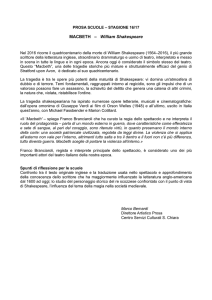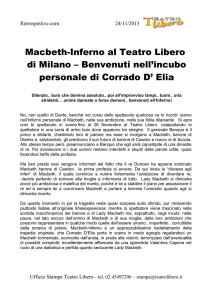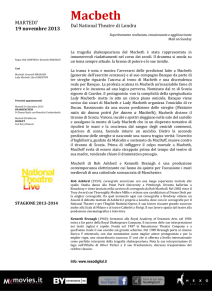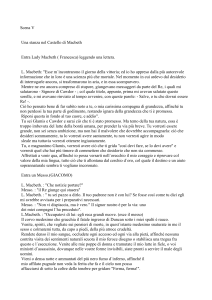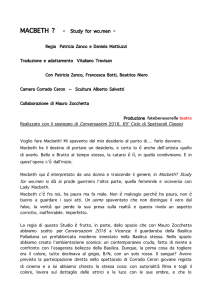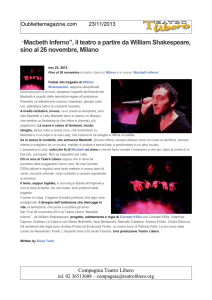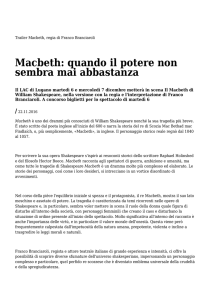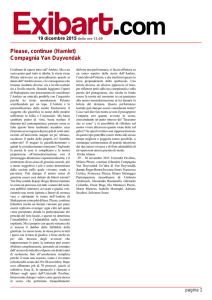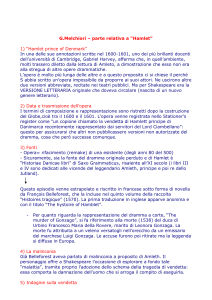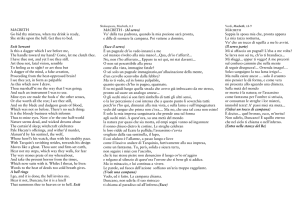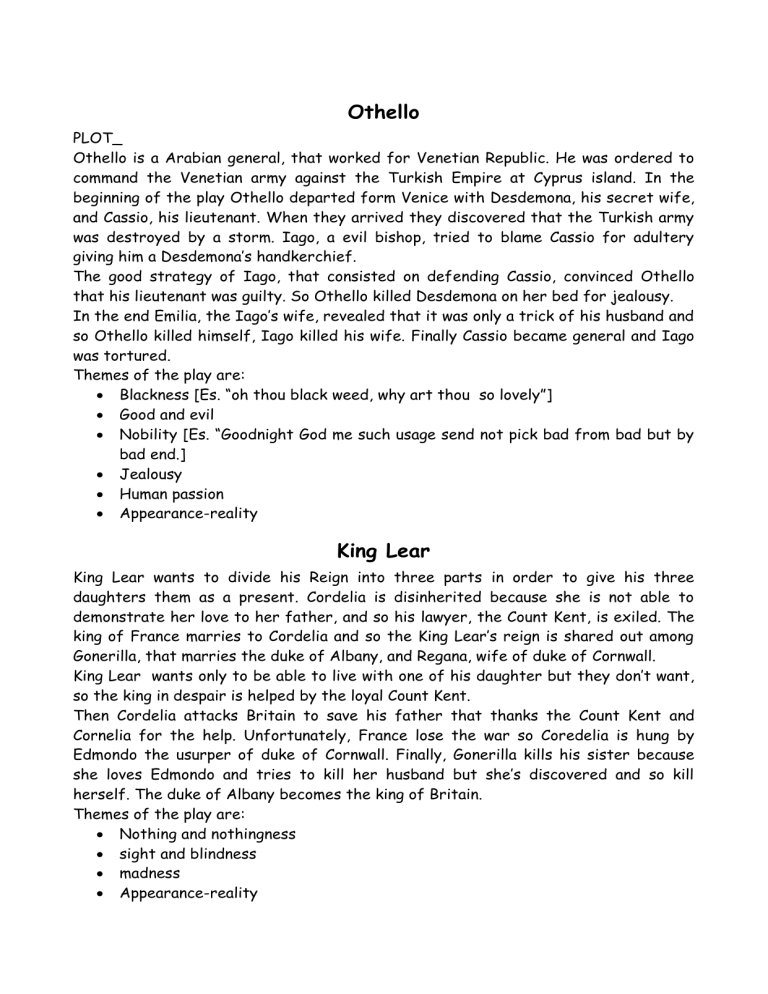
Othello
PLOT_
Othello is a Arabian general, that worked for Venetian Republic. He was ordered to
command the Venetian army against the Turkish Empire at Cyprus island. In the
beginning of the play Othello departed form Venice with Desdemona, his secret wife,
and Cassio, his lieutenant. When they arrived they discovered that the Turkish army
was destroyed by a storm. Iago, a evil bishop, tried to blame Cassio for adultery
giving him a Desdemona’s handkerchief.
The good strategy of Iago, that consisted on defending Cassio, convinced Othello
that his lieutenant was guilty. So Othello killed Desdemona on her bed for jealousy.
In the end Emilia, the Iago’s wife, revealed that it was only a trick of his husband and
so Othello killed himself, Iago killed his wife. Finally Cassio became general and Iago
was tortured.
Themes of the play are:
Blackness [Es. “oh thou black weed, why art thou so lovely”]
Good and evil
Nobility [Es. “Goodnight God me such usage send not pick bad from bad but by
bad end.]
Jealousy
Human passion
Appearance-reality
King Lear
King Lear wants to divide his Reign into three parts in order to give his three
daughters them as a present. Cordelia is disinherited because she is not able to
demonstrate her love to her father, and so his lawyer, the Count Kent, is exiled. The
king of France marries to Cordelia and so the King Lear’s reign is shared out among
Gonerilla, that marries the duke of Albany, and Regana, wife of duke of Cornwall.
King Lear wants only to be able to live with one of his daughter but they don’t want,
so the king in despair is helped by the loyal Count Kent.
Then Cordelia attacks Britain to save his father that thanks the Count Kent and
Cornelia for the help. Unfortunately, France lose the war so Coredelia is hung by
Edmondo the usurper of duke of Cornwall. Finally, Gonerilla kills his sister because
she loves Edmondo and tries to kill her husband but she’s discovered and so kill
herself. The duke of Albany becomes the king of Britain.
Themes of the play are:
Nothing and nothingness
sight and blindness
madness
Appearance-reality
Machbeth
Machbeth and Banquo are winners against some rebels commanded by the general
McDonald and meet three witches. One of their greets Machbeth as the Baron of
Glamis, one as Baron of Cawdor and the third witch forecasts that he will be the
future king and they announce in advance that Banquo will be the progenitor of a royal
family, then the whitches disappear. Immediately comes a Baron that announces that
Machbeth has become the Baron of Cawdor. So Machbeth wirtes to his wife a letter
about this fact and when the king Duncan goes to the Machbeth’s castle the lady
convices the husband to kill the king of Scotland. After that Machbeth is despair and
so the lady tries to divert the suspects to servants, but when people find the body of
Duncan Machbeth kills the servants. The Dauncan’s soons run away for fear so
Machbeth becomes the king of Scotland. But the king is afraid of Banquo because of
prophecy therefore Machbeth orders two killers to kill him during hunting. During a
lunch the ghost of Banquo appears to Machbeth so he goes to the three witches that
forecasts that the king will be killed by a man that isn’t born by a woman and when
the wood will approach.
In meanwhile lady Machbeth is overwhelmed by the blames and see her hands
colorated by blood. Finally the Barons of Scotland attacks Machbeth: the army
approaches as a wood in fact soldiers take some branches to hide their real number;
and the king is killed by McDuff a man born with a caesarean section.
Hamlet
1. The ghost of Hamlet’s father appears to Horatio, Marcellus, and Barnardo.
Horatio begs the apparition to speak (1.1.127), but it refuses. Horatio reports
the encounter to Hamlet.
2. The Ghost appears to Hamlet and they leave to speak in private (1.4.86).
3. The Ghost reveals that he is, in fact, the ghost of Hamlet’s father. The
revenge plot is established with the Ghost’s utterance, "So art thou to
revenge, when thou shalt hear" (1.5.7). He tells Hamlet that he was poisoned by
his brother Claudius as he slept in his orchard and, if Hamlet is not already
feeling the desire, the Ghost makes plain the demand: "Revenge his foul and
most unnatural murder" (25).
4. To be certain of Claudius's guilt, Hamlet decides to reenact the murder of his
father with the production of The Murder of Gonzago (known also as the play
within the play or The Mousetrap). If Claudius is disturbed by the play it will
reveal his guilt. In Hamlet's words:
5. Hamlet stages The Murder of Gonzago and Hamlet and Horatio agree that the
agitated Claudius has behaved like a guilty man during the production (3.2.284).
6. Hamlet has an opportunity to kill the unattended Claudius in his chamber, but,
after soliloquizing on the matter, he decides not to take action because
Claudius is praying. Killing Claudius in prayer would not really be revenge
because he would go to heaven, "fit and season’d for his passage" (3.3.86).
7. Hamlet kills Polonius, mistaking him for Claudius as he hides behind a curtain.
(3.4.22)
8. The Ghost appears again to Hamlet. He is angry because Claudius is still alive.
He tells Hamlet he has returned to "whet thy almost blunted purpose" (3.4.111).
9. Claudius banishes Hamlet to England for the murder of Polonius (4.3.46). He
sends Rosencrantz and Guildenstern to spy on Hamlet’s actions (55) and makes
plans to have Hamlet assassinated on English soil.
10. Horatio receives a letter from Hamlet reporting that he is returning to
Denmark, thanks to pirates who had captured his boat and released him on the
promise of future reward (4.6.11).
11. Claudius hears of Hamlet's return and he conspires with Laertes, Polonius's
son, to murder Hamlet. Laertes will use a poison-tipped sword during a fight
with Hamlet, and Claudius will have a poisoned drink at the ready (4.7.126-161).
12. Hamlet stabs Claudius (5.2.311) and forces him to drink the poisoned wine
(316). The revenge plot is thus concluded. Hamlet himself then dies from the
wound received during the fight with Laertes (348).
’opera si apre in un’atmosfera di lampi e tuoni in cui tre streghe, (Le Sorelle Fatali, le Norne)
decidono che il loro prossimo incontro dovrà avvenire in presenza di MacBeth. Nella scena
seguente, un ufficiale ferito riporta al re Duncan di Scozia che i suoi generali, MacBeth, barone di
Glamis, e Banquo hanno appena sconfitto le forze congiunte di Norvegia e Irlanda, guidate dal
ribelle MacDonald. Macbeth, congiunto al re, viene lodato per il suo coraggio e prodezza in
battaglia. La scena cambia: MacBeth e Banquo stanno conversando facendo considerazioni sul
tempo e sulla loro vittoria. Mentre passeggiano nella brughiera, le tre streghe, che stavano
aspettando, compaiono a loro e pronunciano profezie. Anche se Banquo per primo le sfida, esse si
rivolgono a MacBeth. La prima lo saluta come Barone di Glamis, la seconda come Barone di
Cawdor e la terza gli preannuncia che diverrà re in futuro. Macbeth sembra basito nel suo silenzio
così Banquo ancora una volta le sfida. Le streghe lo informano che Banquo d’altra parte, sarà il
capostipite di una dinastia di re. Mentre i due uomini si stupiscono delle parole delle streghe, queste
svaniscono e un altro barone, Ross, un messaggero del re, subito arriva e informa MacBeth del
titolo che questi ha appena acquisito: Barone di Cawdor. La prima profezia è così realizzata.
Immediatamente MacBeth incomincia a nutrire l’ambizione di diventare re. Macbeth scrive alla
moglie delle profezie delle tre streghe. Quando Duncan decide di soggiornare al castello di
MacBeth a Inverness, Lady MacBeth escogita un piano per ucciderlo e assicurare il trono di Scozia
al marito. Anche se MacBeth mostra preoccupazione all’idea di un regicidio, Lady MacBeth alla
fine lo persuade a seguire il suo piano. Nella notte della visita, MacBeth uccide Duncan. L’azione
non viene vista dal pubblico ma lascia MacBeth così scosso che Lady MacBeth deve assumere il
comando del tutto. Secondo il suo piano, dirotta i sospetti sulle guardie del re addormentate facendo
trovare i pugnali insanguinati in mano loro. Il mattino dopo arrivano Lennox, un nobile scozzese e
MacDuff, il leale barone di Fife. Il portiere apre il portone e MacBeth li conduce nella stanza del re
dove MacDuff scopre il cadavere di Duncan. In un simulato attacco di rabbia, MacBeth uccide le tre
guardie prima che queste possano protestare la propria innocenza. MacDuff è subito dubbioso
riguardo la condotta di MacBeth ma non rivela i propri sospetti pubblicamente. Temendo per le loro
vite, i figli di Duncan, scappano: Malcolm in Inghilterra e Donalbain in Irlanda. La fuga dei
legittimi eredi li rende però dei sospetti e MacBeth sale al trono di Scozia come congiunto all’ex re
defunto. A dispetto del suo successo, MacBeth non è a suo agio riguardo la profezia per cui Banquo
sarebbe diventato il capostipite di una dinastia di re. Così invita Banquo ad un banchetto reale e
viene a sapere che Banquo e il suo giovane figlio, Fleance, sarebbero usciti per una cavalcata quella
sera stessa. MacBeth ingaggia due sicari per uccidere Banquo e Fleance (un terzo sicario compare
misteriosamente nel parco prima dell’omicidio). Mentre gli assassini uccidono Banquo, Fleance
riesce a fuggire. Al banchetto si presenta il fantasma di Banquo che siede al posto riservato a
MacBeth ma solo MacBeth può vederlo. Il resto dei convitati è spaventato dalla furia di MacBeth
verso un seggio vuoto finché una disperata Lady Macbeth ordina a tutti di andare via. MacBeth,
sconvolto, si reca dalle streghe ancora una volta. Queste evocano tre spiriti latori di ulteriori
profezie e avvertimenti:
Atto I
Il padre di Amleto,Re di Danimarca, è morto da soli due mesi ma la madre del Principe, la Regina
Geltrude ha spostato il cognato Claudio, che è appena diventato Re.
Un Fantasma, che assomiglia al vecchio Re, è apparso alle sentinelle a guardia del Castello di
Elsinore in caso di attacco da parte di Fortebraccio, Principe di Norvegia.
Amleto e il suo amico Orazio si accordano per incontrarsi di notte nella speranza di vedere il
Fantasma; cosa che accade. Il Fantasma dice ad Amleto di essere stato ucciso da Claudio, che gli ha
versato un veleno nelle orecchie mentre egli dormiva nel frutteto. Il Fantasma chiede ad Amleto di
punire l'assasino ma lasciare al cielo la punizione della madre.
Atto II
Amleto finge dunque di essere pazzo, così da portare avanti più facilmente il suo piano.
Polonio, il consigliere del Re ritiene che sia l'amore per sua figlia Ofelia la causa della pazzia del
Principe. Quest'ultimo si accorda con una compagnia di attori perchè inscenino La morte di
Gonzago,opera dalla trama simile alla storia raccontatagli dal Fantasma.
Atto III
La rappresentazione teatrale inizia e il Re Claudio si alza e esce. Mentre Amleto raggiunge le stanze
della madre vede il Re pregare ma desiste dall'ucciderlo perchè vuole che la sua anima sia dannata,
cosa che non si verificherebbe se egli morisse in simile stato di grazia. Durante la discussione che
ha in seguito con la madre Amleto uccide accidentalmente polonio, che era nascosto dietro una
tenda ad ascoltare. Dopo questo gravissimo fatto, Claudio decide di mandare Amleto in Inghilterra
per liberarsi di lui.
Atto IV
In Inghilterra Claudio ha assoldato dei sicari per uccidere il Principe, che però riesce a scappare e a
tornare a casa. Ofelia nel frattempo impazzisce e si suicida. Suo fratello Laerte, volendo vendicarla,
accetata il duello che Claudio ha organizzato tra lui e Amleto.
Atto V
Il Re prepara una coppa avvelenata che avrebbe dovuto bere Amleto durante il duello ma che viene
bevuta dalla Regina. Laerte ferisce Amleto con la punta avvelenata della sua spada ma le spade
vengono scambiate erroneamente e Laerte viene ferito dalla sua stessa spada.
La Regina muore; Laerte smaschera i piani del Re, che viene accoltellato da Amleto, e poi muore.
Amleto chiede ad Orazio di raccontare la tragica vicenda e si raccomanda che Fortebraccio sia
proclamato Re, poi muore.
Fortebraccio arrriva e prende possesso del regno, dopo aver dato onori militari alla salma di
Amleto.

